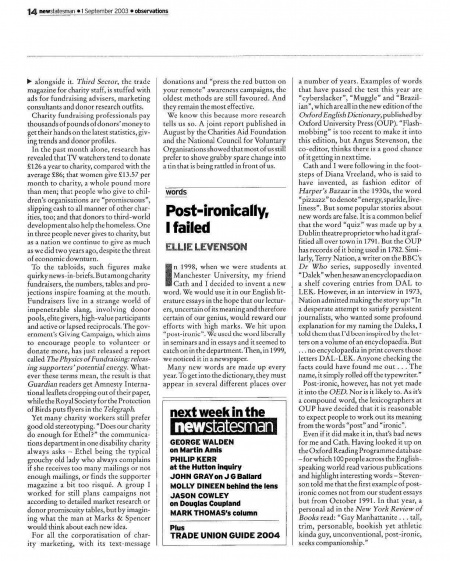Post-ironically, I failed
- Publication: New Statesman
- Date: 2003-09-01
- Author: Ellie Levenson
- Page: 14
- Language: English
In 1998, when we were students at Manchester University, my friend Cath and I decided to invent a new word. We would use it in our English literature essays in the hope that our lecturers, uncertain of its meaning and therefore certain of our genius, would reward our efforts with high marks. We hit upon "post-ironic". We used the word liberally in seminars and in essays and it seemed to catch on in the department. Then, in 1999, we noticed it in a newspaper.
Many new words are made up every year. To get into the dictionary, they must appear in several different places over a number of years. Examples of words that have passed the test this year are "cyberslacker", "Muggle" and "Brazilian", which are all in the new edition of the Oxford English Dictionary, published by Oxford University Press (OUP). "Flashmobbing" is too recent to make it into this edition, but Angus Stevenson, the co-editor, thinks there is a good chance of it getting in next time.
Cath and I were following in the footsteps of Diana Vreeland, who is said to have invented, as fashion editor of Harper's Bazaar m the 1930s, the word "pizzazz" to denote "energy, sparkle, liveliness". But some popular stories about new words are false. It is a common belief that the word "quiz" was made up by a Dublin theatre proprietor who had it graffitied all over town in 1791. But the OUP has records of it being used in 1782. Similarly, Terry Nation, a writer on the BBC's Dr Who series, supposedly invented "Dalek" when he saw an encyclopaedia on a shelf covering entries from DAL to LEK. However, in an interview in 1973, Nation admitted making the story up: "In a desperate attempt to satisfy persistent journalists, who wanted some profound explanation for my naming the Daleks, I told them that I'd been inspired by the letters on a volume of an encyclopaedia. But ... no encyclopaedia in print covers those letters DAL-LEK. Anyone checking the facts could have found me out ... The name, it simply rolled off the typewriter."
Post-ironic, however, has not yet made it into the OED. Nor is it likely to. As it's a compound word, the lexicographers at OUP have decided that it is reasonable to expect people to work out its meaning from the words "post" and "ironic".
Even if it did make it in, that's bad news for me and Cath. Having looked it up on the Oxford Reading Programme database for which 100 people across the English-speaking world read various publications and highlight interesting words - Stevenson told me that the first example of post-ironic comes not from our student essays but from October 1991. In that year, a personal ad in the New York Review of Books read: "Gay Manhattamte ... tall, trim, personable, bookish yet athletic kinda guy, unconventional, post-ironic, seeks companionship."
Disclaimer: These citations are created on-the-fly using primitive parsing techniques. You should double-check all citations. Send feedback to whovian@cuttingsarchive.org
- APA 6th ed.: Levenson, Ellie (2003-09-01). Post-ironically, I failed. New Statesman p. 14.
- MLA 7th ed.: Levenson, Ellie. "Post-ironically, I failed." New Statesman [add city] 2003-09-01, 14. Print.
- Chicago 15th ed.: Levenson, Ellie. "Post-ironically, I failed." New Statesman, edition, sec., 2003-09-01
- Turabian: Levenson, Ellie. "Post-ironically, I failed." New Statesman, 2003-09-01, section, 14 edition.
- Wikipedia (this article): <ref>{{cite news| title=Post-ironically, I failed | url=http://cuttingsarchive.org/index.php/Post-ironically,_I_failed | work=New Statesman | pages=14 | date=2003-09-01 | via=Doctor Who Cuttings Archive | accessdate=15 December 2025 }}</ref>
- Wikipedia (this page): <ref>{{cite web | title=Post-ironically, I failed | url=http://cuttingsarchive.org/index.php/Post-ironically,_I_failed | work=Doctor Who Cuttings Archive | accessdate=15 December 2025}}</ref>
